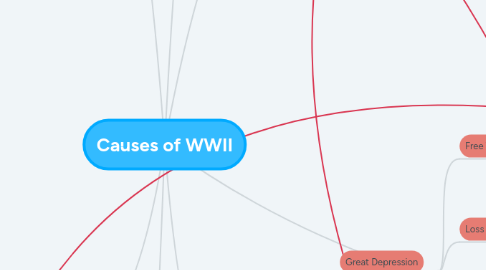
1. When did WWII Start?
1.1. War started in 1939, with the declaration of war by the British and the French
1.2. War was globalized in 1941 with the declaration of war by the USA on Japan
2. Hitler
2.1. Rise to Power
2.1.1. Neutralises any domestic opposition
2.1.1.1. Gains complete dictorial power through the enabling act 1933
2.1.2. Discontent with Status Quo - Experimentation with Extreme forms of Government
2.1.2.1. Failure of Democratic Government to Aleviate economic strain
2.1.2.1.1. WW1 War Costs and Debt
2.1.2.1.2. Reparations and Loss of colonies - Treaty of Versailles
2.1.2.1.3. Great Depression / Wallstreet Crash
2.2. Strengeth Military
2.2.1. Disdain for Treaty of Versailles
2.2.1.1. Popular sentiment among German population
2.2.1.2. Introduces conscription 1935
2.3. Aggressive Foreign Policy
2.3.1. Occupation of Rhineland 1936
2.3.2. Anschluss with Austria 1938
2.3.3. Occupation of Sudetenland 1938
2.3.4. Invasion of Poland 1939
2.3.4.1. Britain and France declare war on Germany
2.4. Gambled on International Response
2.4.1. Met little resistance
2.4.1.1. American Isolationism
2.4.1.2. British and French Appeasment
2.5. Although a multitude of long term factors fueled the volatile political climate in 1939, Hitler was the spark which ultimately lit the fire of war.
3. Exclusion
3.1. American Isolation After WW1
3.1.1. Not actively involved in European affairs
3.1.2. Not a member of LoN
3.2. German Nationalism
3.2.1. Felt humiliated and treated unjustly by the outcomes of WW1
3.2.1.1. Strengthened indepentance and racial identity
3.2.1.1.1. Antagonized non-Germanic peoples ie. Jews
3.2.1.1.2. Sought to unite Germanic peoples (Austria, Czechoslovakia)
3.2.1.2. "Germany VS. The World"
3.3. Russian Isolation during Interwar Years
3.3.1. Fear of Spreading Communism (Bolshevism)
3.3.1.1. Lack of trade partners turned Russia to Germany
3.3.1.1.1. Strrengthened Russo-German Relations
3.3.1.1.2. Treaty of Rapallo 1922
3.3.1.2. Reluctance from other European Powers to leave Germany durastically weakened and succeptable to communism after WW1
3.4. Japanese Exclusion
3.4.1. Japan Dissappointed by LoN
3.4.1.1. Rejection of Racial Equality proposal
3.4.1.2. LoN Members mostly European
3.4.2. Dependance on American Dollar proved to be disasterous during Geat Depression
3.4.2.1. Pursuit of economic stabiity and independance through agressive colonial expansion
3.5. In General, Countries were less concerned with cooperation/ diplomacy unlike in Bismark's era - They sought to put their own interests first and foremost
4. Anti-Comitern Pact
5. Nationalism, Expansionism and Aggression of Axis Powers
5.1. Germany
5.1.1. Specific Events
5.1.1.1. Re-militarization of Rhineland
5.1.1.2. Anschluss
5.1.1.3. Czechoslovakia
5.1.1.3.1. Sudetenland
5.1.1.3.2. Full conquering of Czechoslovakia
5.1.1.4. Invasion of Poland
5.1.1.4.1. Declaration of war by Britain and France
5.1.2. Nazi Policies
5.1.2.1. Wanting more land
5.1.2.2. Germans should all live in the same land
5.1.2.3. Western democracies were horrible
5.2. Italy
5.2.1. Specific Events
5.2.1.1. Abyssinian Crisis
5.2.1.1.1. Drove Italy away from Britain and France
5.2.1.1.2. Loss of the Stresa Front
5.2.1.1.3. Illustration of the dysfunctional League of Nations
5.2.2. Fascist policies
5.2.2.1. Wanted to being back the Roman Empire into modern times
5.2.3. Didn't feel they got enough from the Paris Peace Conference
5.3. Japan
5.3.1. Desire to appear as a great power
5.3.2. Specific events
5.3.2.1. Manchurian Crisis
5.3.2.1.1. One of first signs of failure of LoN
5.3.2.2. Second Sino-Japanese War
5.3.2.2.1. Deterioration of US-Japanese relations
5.3.2.3. Invasion of French Indochina
5.3.2.3.1. US-Japanese relations broken
5.3.2.4. Bombing of Pearl Harbour
5.3.2.4.1. Bringing USA into the war
5.4. Along witht the need for food and resources which motivated colonial expansion was the need for honor and the desire for a country to prove itself on the global stage. For the sake of bringing glory to the homeland, Japan, Germany, and Itally all pursued increasingly agressive foreign policies.
6. Diplomacy
6.1. Paris Peace Conference 1919
6.1.1. Treaty of Versailles
6.1.1.1. Economic distraught for Germany
6.1.2. Allies could not agree on method of attacking dealing with Germany
6.1.2.1. Settled on 'middle ground'
6.1.2.1.1. Made Germany more resentful
6.1.2.1.2. Allowed Germany opportunity to rearm
6.2. Appeasement
6.3. Munich Agreement
6.3.1. Isolation of Soviet Union
6.4. Rome-Berlin Axis
6.4.1. Alliance between Italy and Germany
6.5. From Bismark to Hitler, a long string of diplomatic interactions culminated into the circumstances which set the world powers on a course for war. It was the combined affect of the choices made by the many leaders and decision makers of History which produced the end product of two world wars.
7. Economics
7.1. Great Depression
7.1.1. Free Trade Deterioration
7.1.1.1. Protectionist Policies
7.1.1.2. Explanation: Nations closed their trade borders as a way to protect their own local industries
7.1.2. Loss of Wealth
7.1.2.1. Desperation
7.1.2.2. Explanation: When a population faces hardship, they are more desperate to find solutions
7.1.2.2.1. Expansionism in another
7.1.3. Loss of Approval with the State
7.1.3.1. Expansionism for Popularity
7.1.3.2. Explanation: A state may seek militaristic endeavors in order to gain popularity in such a horrible, depressing time.
7.1.4. Trade Isolationism in one State
7.1.4.1. Explanation: Countries which were limited by their lack of colonial territories struggle to find raw materials, and may revert to getting them by force
7.2. Hyperinflation
7.2.1. Loss of Wealth

